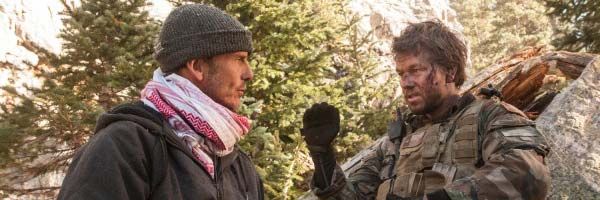Opening tomorrow is director Peter Berg’s (The Rundown, The Kingdom) adaptation of the true-life memoir of Marcus Luttrell, Lone Survivor. The powerful film tells the story of four Navy SEALs on an ill-fated covert mission who try to neutralize a high-level Taliban operative, but are ambushed by enemy forces in the Hindu Kush region of Afghanistan. The film stars Mark Wahlberg, Taylor Kitsch, Emile Hirsch, Ben Foster, Eric Bana, Alexander Ludwig, Ali Suliman, and Rohan Chand. For more on the film, here's the latest trailer.
At the recent New York City press day, I landed an exclusive interview with Peter Berg. He talked about the challenges of making the film, his assembly cut, the test screening process (and how the film scored a 96), what he asked the actors to do prior to filming, how he's changed as a filmmaker, whether we will ever get a sequel to The Rundown, how he got involved with Damon Lindelof's new HBO series The Leftovers, the possibility of another Friday Night Lights movie, and more. Hit the jump for what he had to say.
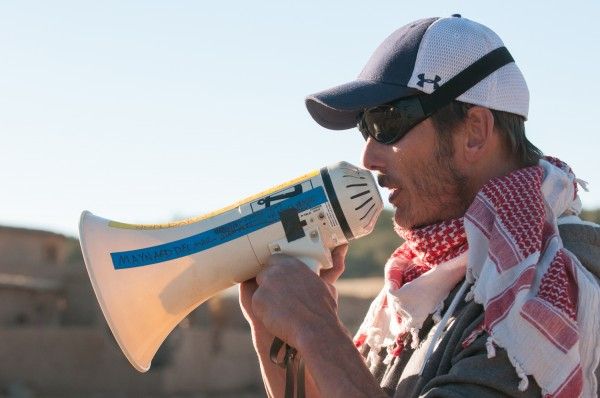
Collider: I’ve very curious about the challenge of bringing this story to life. I know it was a passion project for you. Can you talk a little bit of what you had to go through?
PETER BERG: I think the biggest challenge was being aware of a certain audience that was going to see this film. There’s a big difference from a typical movie, journalists and critics and film goers that go see it find that, that’s the general experience you have as a filmmaker. So that just kind of proves my point that there’s a really different audience. We have nineteen soldiers who were killed, they all have mothers and fathers, brothers and sisters, some have widows, they’re gonna see this film. They have strong opinions about their sons in the story, there's the Navy SEAL community and their families. This woman who just walked in here is Chris Kyle’s widow. Chris Kyle’s a Navy SEAL who was murdered last year—she’s going to see this film. Marcus Luttrell is going to see this film. It’s a very, very intense community, it’s not a joke. It’s not like a typical film and I like movies like 21 Jump Street, a lot of fun, I love them. There’s a great place for them. This is different, this is something that is serious to these people. And as a filmmaker, Ms. Kyle, Melanie Luttrell, Marcus Luttrell, these people that watch the film, I’m actually going to look them in the eye afterwards—an added challenge to my job. While I’m making the film that became something I was very cognizant of every day I would have these kinds of encounters. And they would let me know very clearly whether they thought I got it right or not. Do you understand that?
A hundred percent. You need to hit a different mark when making this film.
BERG: Yes. Correct. And I’m not bad-mouthing 21 Jump Street, I love that movie. It’s just a different experience. That became the toughest thing, making sure every day we had in the back of our—and it’s not just me, it’s the actors also and the crew—we had this audience, these people. This is a community of ten thousand when you add it all up but they’re a very strong opinion community and that’s who I was concerned about when I was making the film.
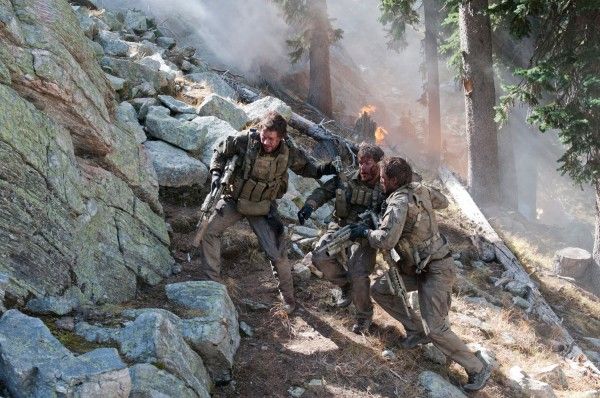
The movie is two hours, how long was your assembly cut when you were putting it together?
BERG: Colby Parker is my editor and he knows I won’t make a film that’s not two hours, so he probably kept it within two hours the whole time. There wasn’t that much that was cut from the film, most everything we shot’s on screen.
So any sorts of cuts were just bits removed from a scene?
BERG: Yeah, just bits removed from a scene. There’s no significant scenes that were cut, nothing’s overused, the gun fight could’ve been longer, falls down the cliff could’ve been longer, at some point it became too much. One of the challenges assembling the film was that gun fight went on for three and a half hours and we obviously couldn’t spend three and a half hours of the film with one gun fight. It was trying to figure out the balance of how much an audience could take before they either became repulsed or desensitized or bored or just overwhelmed. So we probably reduced a bit of the gun fight.
What did you learn from any test screenings that sort of impacted or changed the way you looked at the film?
BERG: We had a first test screening and the studio’s group said the film was too violent and they suggested I cut it a bit before we did our first test screening. And I said, “Well let me at least test it like this so we get a base on it. If we get a hundred walkouts, we’ll know.” And he said, “Okay. Fine.” And the movie tested at a 96, which is the highest test the studio’s ever had. They all left the room smiling and said, “Wow.” They were surprised. They thought maybe it was a false positive or the audience was a little too working class. So, they asked me to test it again in Sherman Oaks for the higher ends. We got the exact same score and the studio became very supportive of it and realized the audience could absorb it. And I said, “Let me take it down to Texas and test it and I'll show you a 100.” But the movie from the get-go played very well, first cut. It was great for me because the testing process is always tricky and can be very frustrating for a filmmaker when it goes bad. When it goes good it’s great because everybody just leaves you alone.
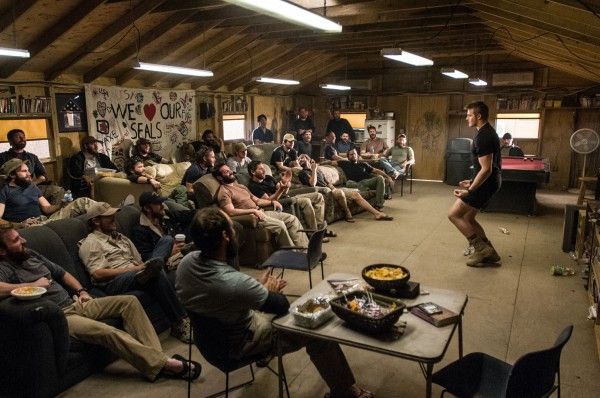
What did you ask the actors to do or what did they do on their own to get ready for this role?
BERG: The main thing I asked them to do, in addition to the normal things which is to rehearse the scenes and understand the scenes, make certain assumptions and decisions about characters, all those normal things you do in any film. I asked them to spend as much time with the families of the SEAL that they were playing and the SEAL community and go through our training process which was about two weeks of intense training for them. And then every day, we had SEALs on set for them. One of them spent as much time with the SEALs and their families so they could kind of—not to try to become as tough as a SEAL, as strong as a SEAL physically, but to try to understand what that character is like and what that personality type is like so they could capture it. So we spent a lot of time with Navy SEALs.
As a filmmaker, how have you changed—if at all—as you’ve been furthering along in your career?
BERG: I think I’ve been fortunate enough to have a fairly long career and hopefully I’m at the middle of it now. And I think I’m starting to develop a certain amount of experience and a certain amount of wisdom about kind of what really matters and what doesn’t matter. I tend to not have to handle things that are probably gonna end up being irrelevant, that aren’t gonna have much to do with the film. I have probably a better understanding of really what does matter, when to pick my battles and when to kind of let them go. I’m much more collaborative than I probably was when I was first starting, much more willing to say, “I don’t know the answer to that.” I have really talented people and let them do their jobs and not try to control everything as much as I did when I was starting. I was a bit more insecure.
Does people asking you about a sequel to The Rundown ever get old?
BERG: No, never. We just met with the writers, so we’re trying to do it. I want to do it. I’ve talked to Dwayne [Johnson], I have an actor in mind that I can’t say, that I want to work with Dwayne on it. We want to do it, we’re meeting with the writers now.
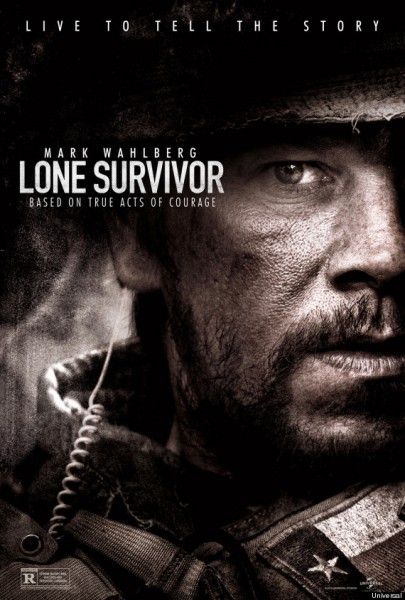
You directed the pilot of
The Leftovers. What was it about the material or were you friends with Damon Lindelof?
BERG: It was an incredible book by Tom Perrotta, I’m a big fan of Damon Lindelof. It was something unlike anything I’ve ever done and very emotional, unique, intense piece of material. And the finished product, we’re all very happy with. HBO picked it up and we start shooting the series in February here in New York.
Are you doing some of the episodes?
BERG: I’m directing the next episode. So, I did the pilot and I’m gonna be directing the second episode. Damon Lindelof is the showrunner, he’s the clear force behind it but I’m a big fan of his. You asked me how I’ve changed as a filmmaker, I was able to really collaborate with Damon. And that’s something I probably couldn’t have done ten years ago. It would’ve been hard for me. And now to be able to learn from someone like Damon Lindelof and get into that kind of mind, that’s sort of out of my comfort zone what he does, and I really enjoy working with him.
As a Friday Night Lights fan, I’m not 100% that another movie is going to work, because it wraps so well.
BERG: There’s not going to be another movie. We talked about it, some people thought it was a good idea, some didn’t. I’ve come to believe it’s probably not a good idea. I seriously doubt it’s going to happen.
Lone Survivor opens tomorrow in theaters.
 Collider: I’ve very curious about the challenge of bringing this story to life. I know it was a passion project for you. Can you talk a little bit of what you had to go through?
Collider: I’ve very curious about the challenge of bringing this story to life. I know it was a passion project for you. Can you talk a little bit of what you had to go through?
 You directed the pilot of The Leftovers. What was it about the material or were you friends with Damon Lindelof?
You directed the pilot of The Leftovers. What was it about the material or were you friends with Damon Lindelof?

